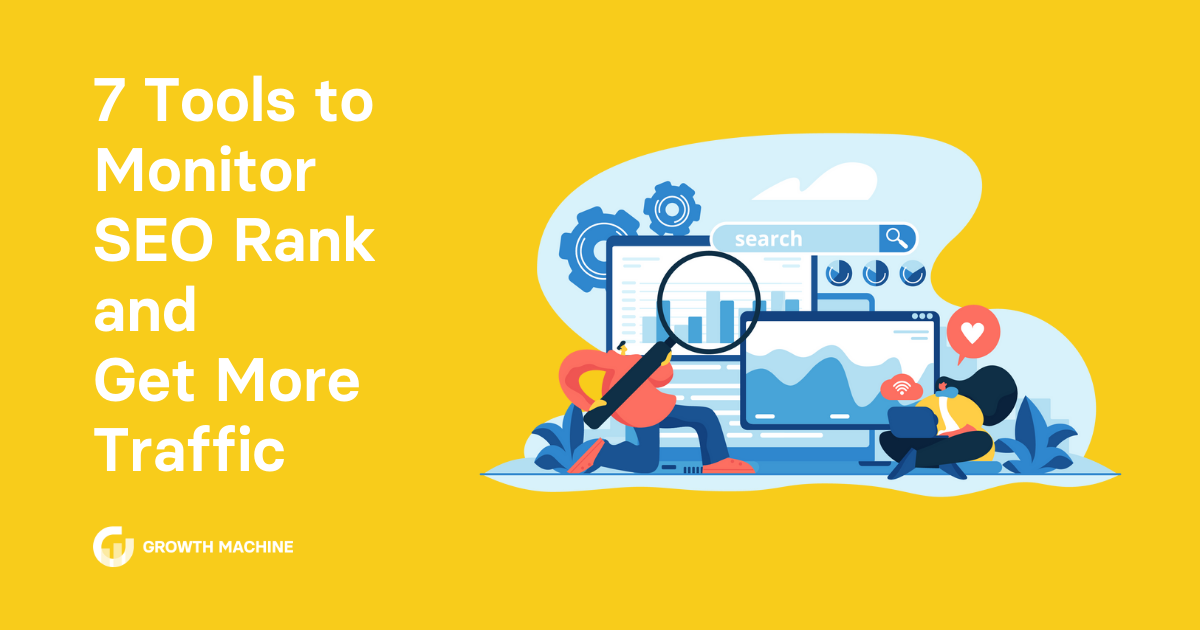7 Agency Approved Tools to Monitor SEO Rank and Get More Traffic
In addition to a solid keyword strategy, the unsung hero of SEO is monitoring tools. It may not be flashy or fun, but monitoring is one of the most valuable tools for tracking, adjusting, and optimizing your ranking strategy.
Clients are always surprised to hear that our SEO (search engine optimization) strategy typically produces meaningful results in 6-9 months. For some, that seems like a long time, but for those who have tried to do their own SEO, that is pleasantly quick.
Without sharing all of our secrets, this is one hill we will die on: Keeping a close eye on ranking progress is part of the recipe for success.
From the time we begin publishing for a client, our team closely monitors their progress, tracking their monthly organic sessions and where they rank for certain keyword phrases, and tweaking our strategy accordingly to make sure we’re moving toward traffic and ranking goals.
At Growth Machine, we use many tools to monitor SEO rank for our clients. Below, we share our preferred tools for the job (and why), as well as a few other popular platforms to track SEO rankings in-house.
7 Tools That Monitor SEO Rank for Your Content
You can’t execute a successful SEO strategy without tracking specific metrics and adjusting accordingly. Thankfully, there are a number of professional tools out there that can help you stay on top of your site’s ranking progress so that you can quickly correct any errors and capitalize on SEO momentum.
To set your content strategy up for success, consider using these tools for SEO ranking monitoring:
1. AccuRanker
At Growth Machine, we use AccuRanker to track keywords and the organic traffic they generate for our clients. Designed for large enterprises and SEO agencies, AccuRanker’s SERP (search engine results page) tracker offers daily updates on keyword ranking positions, on desktop and mobile, across dozens of geographic markets.
AccuRanker’s advanced reporting dashboard offers a historical view of your keyword rankings, allowing you to track rankings and compare progress at specific points in time.
Pricing: Starts at $116 per month for 1,000 keywords, including a 14-day free trial.
2. Ahrefs
Ahrefs is an all-in-one SEO tool that features website ranking audits, competitor analysis, keyword research, and a rank tracker. We use it for various research, tracking, and monitoring tasks, including keyword research, technical auditing and monitoring, and competitive gap analysis.
Ahrefs also gives us insight into a site’s backlinks, total and keyword-specific organic traffic, and data related to paid advertising for keywords.
This tracking software comes with an exhaustive list of suggestions to optimize your site for SEO, including how to improve site speed, add H2 tags, remove custom CSS, or add meta descriptions.
Pricing: Starts at $99 per month for the Lite plan.
3. Moz
Moz (formerly SEO Moz) is one of the most well-known SEO rank tracking tools on the internet, serving small business owners and enterprises alike. The platform encompasses Moz Pro (a do-it-all platform to improve your SEO efforts), Moz Local (to increase exposure for your brick and mortar), and STAT (a SERP rank tracker with millions of keywords covered).
Moz Pro monitors rankings for a number of keywords, understands your target audience, and crawls your website to search for unknown bugs or other issues. In addition, it gives a “grade” to each page on your site, providing a page optimization score with prioritized site improvement recommendations. Finally, Moz Pro can launch or improve your backlink strategy, helping to find new link opportunities and track your page authority over time.
Pricing: Starts at $99 per month for the Moz Pro plan, includes a 30-day free trial.
4. Google Search Console
One of the first steps to implementing a new SEO strategy should always include setting up your Google Search Console (GSC).
GSC is a free resource that tracks organic search traffic, monitors site performance, and fixes bugs that could negatively impact your SEO strategy. Setup is pretty straightforward. Before accessing Google’s ranking reports, you must prove that you own the website you want to optimize (typically by accessing your DNS records through your site host). From there, you can utilize Google’s Search Analytics to see which keyword phrases are driving traffic toward your site.
You can submit your sitemap to Google for crawling and engage the URL Inspection Tool to see how Google indexes and views information on your site. Finally, you can set up email alerts, so you know whenever there is a bug you need to fix.
Unlike other tools that use their proprietary algorithm to approximate Google’s rankings, the GSC data comes straight from the source. (Remember: When it comes to ranking, the Google algorithm makes the rules. This is one of the biggest advantages of using the Search Console. That, and it’s completely free!!)
Pricing: Free
5. Semrush
Semrush is a popular SEO and content strategy platform with over 10 million users, including solopreneurs, Fortune 500 companies, and SEO agencies.
The all-encompassing tool allows digital marketing experts to conduct keyword research, track SERP positions in real-time, analyze backlinks, and even run technical SEO site-wide audits.
Semrush’s user-friendly platform helps content marketers discover topics that resonate with their target audience and track brand mentions across the internet. In addition, you can stay up-to-speed on your competitors’ progress by analyzing traffic for any website.
Finally, if your marketing strategy extends to pay-per-click (PPC) or social media channels, you can conduct keyword research for your latest paid advertising campaign or create and optimize social posts.
Pricing: Starts at $119.95 per month, includes a 30-day free trial. Offers a free plan with limited features.
6. Google Analytics
While not necessarily a tool to directly monitor your site’s SEO ranking metrics, Google Analytics offers invaluable data to track how well your content performs online, especially when paired with Google Search Console. (As a best practice, you should always integrate Google Analytics with the Google Search Console to get the most from both platforms.)
As a starting point, Google Analytics’s tracking data measures which pages and blog posts receive the most traffic, so you can focus on those with the most potential to rank better with a little SEO boost. You can also get a 35,000-foot view of your site’s performance, including where your traffic is coming from other than organic channels and what percentage of the total organic traffic makes up.
You can get input on your backlink strategy by viewing Google’s referral data, where you can see the types of sites that are linking back to you and reach out to similar sites as part of a linkbuilding strategy.
You can also better understand what your audience is interested in by viewing their path through the site (i.e., what content they are viewing) and plan future content accordingly.
Finally, creating “goals” in Analytics allows you to manage and track your KPIs (key performance indicators), which is a major input in determining SEO performance.
Pricing: Free
7. Yoast WordPress Plugin
With over 450 million websites built on WordPress, we would be remiss not to mention Yoast, WordPress’s most downloaded SEO plugin.
Yoast helps users create new, optimized content and identify optimization opportunities within existing content to better rank on search engines. The plugin includes a powerful internal linking feature that assists users in skillfully linking between articles and pages on their website.
Another great Yoast Premium tool is a feature that automatically redirects broken links on your site. While 404 errors aren’t a ranking factor, they affect SEO because broken links make it more difficult for Google to crawl your site and make for a frustrating user experience.
While it’s not an obvious choice for rank tracking, we’ve included Yoast in this list because it gives site owners helpful insights. Users can see how their articles stack up against competitor articles. And Yoast offers tips for improving articles that are ranking poorly or falling in rank compared to top-ranking articles on the same topic.
Yoast Premium offers several helpful SEO tools and an SEO training course, but, arguably, their best feature is the seamless integration with many valuable SEO tools, like SEMrush.
Pricing: Free for the limited version, $99/yr for Premium.
Launch Your SEO and Content Strategy With Growth Machine
You can’t grow what you can’t measure. Therefore, you can’t expect to execute a successful SEO strategy without tracking various keyword positions, organic traffic, and site performance.
Luckily, plenty of paid and free SEO ranking monitor tools are available online. Use these platforms to conduct keyword research, check your site for technical issues that might be hindering organic growth, and — of course — monitor your rankings and traffic.
Consider partnering with Growth Machine to help understand your SEO data and to increase your organic traffic. We’ve assisted companies scale their organic search volume six-fold in six months and hit 100,000 site visitors in that same time frame. We can deliver the same for you and take care of the monitoring too!
Contact us to learn more about how we can support your organic traffic growth with unique SEO strategies.







